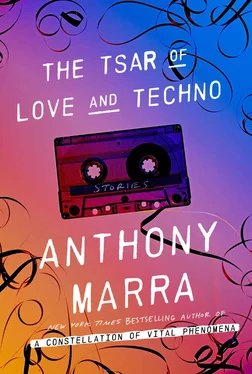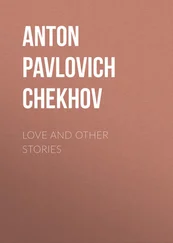Irina Portnova was prima ballerina of the Kirov Ballet (today the Mariinsky) from 1932 to 1937 , the information card read. Her career ended when she was charged with espionage, sabotage, and wrecking, as part of a Polish spy ring. If you look at Markin’s falsified version, you will notice that Portnova’s hand has been left floating above the stage. Is it an error? A warning to the viewer? An act of dissent? It’s difficult to say. Take a look at the background of both images. If you study them closely, you might detect the addition of a figure in the censored version where—
He turned to the altered photograph.
“Roman Markin did one remarkable thing,” the curator was saying. “Beginning in the mid-nineteen thirties, nearly every time he expunged a face from a photograph or painting, he inserted one.”
Your father is there , his uncle had told him, in the background, where no one can see him— where, uncle, where is he? Within the somber suit? Beneath the general’s epaulettes? No, no, no, no, no, until, finally, my god, yes, there he is, in the audience, gray-eyed, cowlicked, peaceful, alive. You thought you had forgotten his face. That he was lost. Expunged. Gone. But there. In the third row. He stares out. Not at the dancer. At you. To be here, at this late hour in your life, and to recognize your father, to find him, it makes the whole world you’ve wandered through feel as narrow as a blade of grass.
“If you walk along this wall, you’ll notice that this person appears in every censored image,” the curator continued. “The object labels will tell you exactly where. Sometimes as a boy, sometimes as a man, other times in old age. Often he is inserted in the space where the censored figure has been removed.”
“Who is he?” Vladimir barely got it out.
“I’ve been trying to answer that for years,” she said.
He moved along the wall at processional pace, leaning on Sergei’s arm. The photographs and paintings had been arranged chronologically — not by the date of their composition or alteration, but by the age of Markin’s inserted figure.
His father as a youngster, climbing aboard a tractor.
His father as a teenage revolutionary in a baggy brown jacket, sprinting through the October streets with a pitchfork raised.
His father dressed in a dark suit and navy cap, one arm around a woman who was, on closer study, Vladimir’s mother.
His father holding the hand of a five-year-old Vladimir.
His father as a scientist.
A politician.
A cook.
A peasant.
A farmer.
A builder.
A factory foreman.
A night guard.
A violinist.
A grandfather.
He watched his father age in the background of each image. His hair grayed and thinned to gossamer brushstrokes. His wrinkles drawn, then etched, then engraved in his sinking features. In the final painting, his father stood with a cane, apart from a crowd of cheerful factory workers, staring outward with a bemused smile. The man his father might have become resembled Vladimir.
Am I worthy? he silently asked the figure. It’s been such a long life — what have I done to deserve it?
He leaned into Sergei and for the second time that day Vladimir felt himself righted in the arms of a son who had, somehow, forgiven him, who now, somehow, sustained him.
“I know this is difficult,” Sergei said. “You’re doing so well. I am proud of you.”
Thank you.
The curator followed them to the last image. “It’s remarkable, isn’t it? If there was any goodness in Roman Markin,” she said, “it’s this man, whoever he is.”
The long century of his life converged upon this one vanishing point. He closed his eyes. He kept them closed. He opened them. “You have no guess who he might be?”
“A childhood friend?” she asked.
My father , he thought.
“A brother?” she asked.
My father , he thought.
“A son?” she asked.
His heart can hardly hold the moment.
“My father,” he answered.
Nadya
The dacha appeared ahead, the hill behind it. She declined her driver’s offer to carry her suitcase inside.
“Hello?” she called, but no one answered. She slid the suitcase into the hall closet without unpacking. She went to the kitchen, poured herself a glass of water, frowned at the stack of dirty dishes. Through the window, she watched her daughter spin down the hill, her arms windmilling until she rolled to a gasping halt. At the bottom of the incline, Ruslan glanced up from his open briefcase. He stood, stretched, and climbed up the hill with the girl. The late afternoon sun burned before them, inking them into silhouettes, framed in the pinewood of the kitchen window, the unknowing subject of a work of art only she could see.
She admired the scene for a moment, then walked out the back door to become part of it.
OUTER SPACE, YEAR UNKNOWN
The explosion: a cataract of golden heat, a sudden, rising weightlessness. The dacha, stone fence, the well I lived in, the carefully tended garden, they all fall away as I am peeled from the surface of the planet. Little dill seeds scatter from my palm, constellating the sky.
I wake.
Through the capsule’s stern portal, the sun is a coppery wink. But it is no longer the sun, only one star dissolving by degree into the gauzy sweep of the Milky Way, for the moment still polished brighter than the others.
A half billion kilometers past Neptune’s orbit, the vaporizer died and the cabin turned into a desert. Dryness unlike anything I’ve ever felt: a low acrid burn that makes my joints groan, makes my skin hold the shape of a pinch long after my fingers let go.
I sift through the dust for my forehead and press my finger to the skin. The pain is iridescent. I imagine the bruises in lush purples and crimsons, and wish for a mirror, if only to see those colors again. Turning toward the portal window, metal crinkles. Beneath my uniform, sheets of tinfoil hold my heat to my body.
To reach the end of the solar system I must have journeyed for years, but it feels as if I have only just arrived, just woken here.
The coughing resumes, more spirited than before. It is a point forever pressed against my trachea. The balaclava brings little relief. Goggles fastened from spectacles, foam, and duct tape shield my eyes. A postage stamp of skin unseals from my wrist and drifts into the air. I am turning to dust. Soon I will suffocate me.
Wiping again the glass, I peer through the observation portal but every point of starlight is small enough to snuff with a thimble. Beyond the titanium and thermal lining of the capsule hull, the temperature treads over absolute zero. Solar panels are winged on either side of the entry hatch. An emergency fuel cell stores enough energy to filter the air and eject the dregs once more, twice more, before reaching the Kuiper Belt.
Consider that last horizon line: the outer limits of the solar system, an elliptical orbit of frozen methane, ammonia, and rock. Even with an operational navigation system, the capsule couldn’t pass through. And if it could, what then? Consider the emergency fuel cell, the taste of filtered air. Consider how the last gasp of electricity might otherwise be used. I can breathe clean air again, for a bit longer, or I can power the onboard computer and play the mixtape.
THE cosmos began with the poster of the periodic table Father hung on the bedroom wall. Warm sunshine of halogens, deep indigo of transition metals: more color in those elements than the rest of the room. It stretched a pixilated rainbow between my bed and yours.
With his deep shaking bass, a ball bearing rattling in his voice box, Father described the bonded weight of protons, the unmappable orbits of electrons. You sat next to me on the floor in a legless chair and we listened to him explain that hydrogen, with one proton, and helium, with two, were the only elements naturally present after the Big Bang. They gathered into gaseous clouds that then turned into stars fusing protons at tremendous temperatures. Every element heavier than helium was forged in the nuclear reactions fueling stars, then launched across space in the flash of a supernova.
Читать дальше












